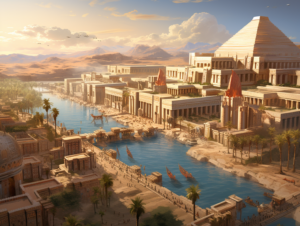
A vertical shot of the patterns on the beautiful sand dunes in the desert
Dune: Awakening immediately impresses with its faithful recreation of Arrakis. As someone who’s spent years devouring both the books and their adaptations, I was genuinely struck by how immersive the world feels. The harsh desert, shifting sands, and ever-present threat of sandworms aren’t just set dressing—they’re woven into the very fabric of gameplay. Funcom has done its homework, delivering what many critics call the “most authentic take on the Dune-iverse imaginable”. The atmosphere is dense and haunting, with every trek across the dunes feeling both dangerous and exhilarating. It’s a world that rewards curiosity but punishes carelessness, and that constant tension is a big part of what makes the experience so compelling.
Survival and Specialisation
Survival is at the heart of Dune: Awakening. You start with almost nothing, forced to learn the ways of the desert—crafting tools, scavenging for water, and building stillsuits to stave off dehydration. The environment isn’t static; shifting sands reveal hidden secrets, while Coriolis storms regularly reshape the landscape, keeping exploration fresh and unpredictable. What stands out is the character progression system, which allows players to specialise as Swordmasters, Troopers, Mentats, Planetologists, or members of the Bene Gesserit. Each path offers unique abilities, and you can mix and match skills to suit your playstyle, whether you prefer combat, crafting, or diplomacy. This flexibility makes every playthrough feel personal and meaningful.
Combat, Politics, and the Spice Economy
Combat in Dune: Awakening is both tactical and expansive, blending solo infiltration missions with large-scale guild battles over spice blows. While the combat system has received mixed feedback—some find it underwhelming or grindy—it’s undeniably layered, with infantry, vehicles, and aerial support all playing a role. The political dimension is just as important. Players can join guilds, pledge allegiance to major factions like the Atreides or Harkonnen, and even influence server-wide decisions through the Landsraad. The spice economy underpins everything, offering power and wealth but also risk, as overuse can have negative consequences.
Community Reception and Technical Impressions
The game’s launch has been met with overwhelmingly positive reactions. With a Steam rating of 87% “Very Positive” and over 19,000 reviews, it’s clear that both newcomers and longtime fans are finding a lot to love. Critics praise its worldbuilding, survival mechanics, and sheer ambition, though some point out issues with combat and base-building, as well as the occasional technical hiccup. I’ve encountered a few bugs and moments of frustration, especially when trying to establish a permanent base in such a hostile environment. However, the sense of community—whether teaming up for epic spice battles or just trading in the bustling social hubs—makes the occasional rough edge feel worth it.
A Bold Step for Survival MMOs
After sinking dozens of hours into Dune: Awakening, I can confidently say it’s one of the most ambitious and atmospheric survival MMOs I’ve played. It’s not perfect—the combat could use refinement, and the grind might deter more casual players—but the sheer scale and depth of the world are unmatched. If you’re a fan of Dune or just love survival games that demand real investment, this is worth your time. Funcom has set a new standard for what it means to adapt a beloved universe, and I’m genuinely excited to see how the game evolves in the months ahead. Arrakis is unforgiving, but that’s what makes every victory feel earned.







